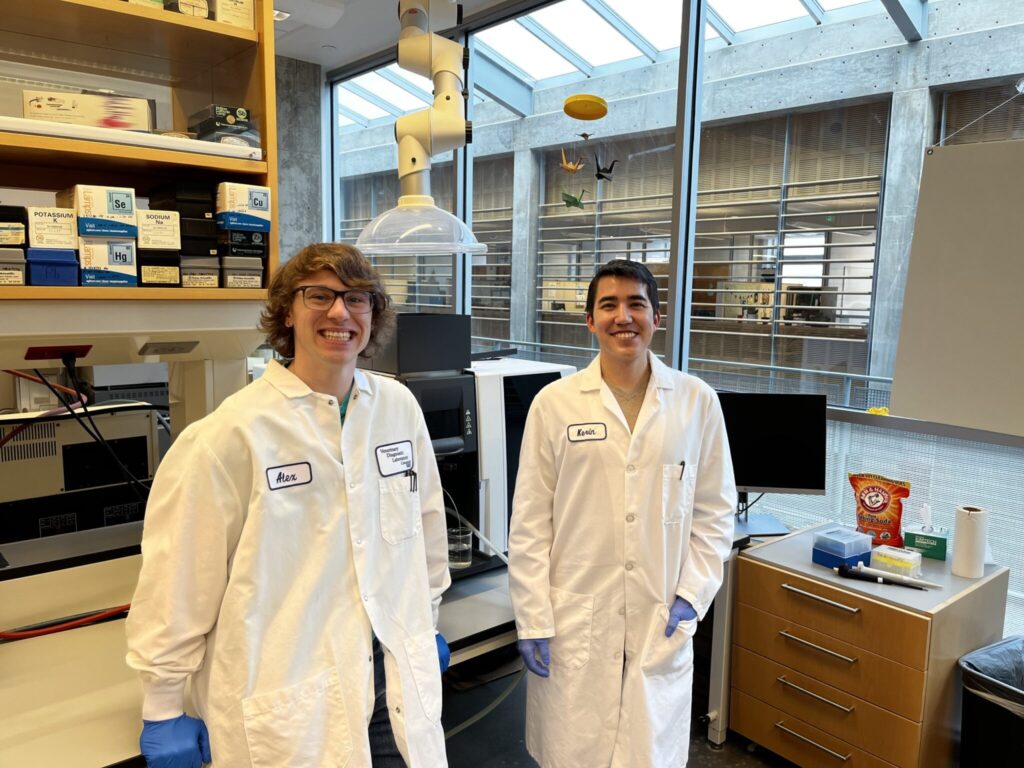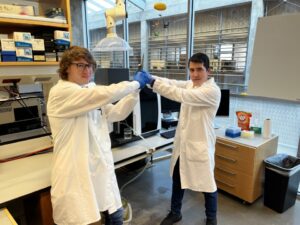
Diagnosing disease is a serious business, but the Veterinary Diagnostic Laboratory’s Chemistry and Toxicology Lab team finds ways to make the workday fun.
The lighthearted group includes Lab Manager Kevin Daniels, part-time Lab Technician and part-time Quality Technician Alex Briggs, and section head and Clinical Diagnostics Associate Director Dr. Gary Mason.

“I call him Super K, and there’s his sidekick, Alex,” said Mason. “Kevin has a tremendous work ethic, and Alex works part-time for us and is also on the quality team, which adds that extra level of detail.”
“I’m the least important part of this team and the only one to get an F in freshman chemistry,” joked Mason.
The section offers veterinarians, researchers, and animal owners a variety of chemical analyses that aid in determining an animal’s nutritional status, measuring therapeutic drug concentrations, and diagnosing environmentally-linked toxins.
They perform nearly 10,000 analyses each year from samples from around the world. Ninety percent of their work is testing canine liver biopsies for copper storage disease, a chronic condition prevalent in many breeds. Once identified, the disease is managed by diet or medication.
Testing for copper involves several steps, including preparing and then drying samples for 24 hours. While tests can’t be run “stat,” the team prides itself on providing quick and accurate results in about a week.
“Speed and immediacy. Getting stuff done sooner rather than later so vets can make accurate and timely diagnoses, that’s important to me,” said Daniels.
The lab’s quantitative accuracy drives a large share of its liver biopsy business. “We have an international reputation and are often consulted for second opinions,” said Mason.
“A marvel of chemistry”
In addition to copper, the lab also conducts nutritional analyses, blood lead, and bromide levels. This is when they have the opportunity to work with other species, including feline, equine, bovine, and avian.
“Our bread and butter is looking at copper,” said Briggs. “All the other tests we run are just as important and impactful. I actually love all the weird stuff we do; it makes things really interesting.”
As a bird lover, Briggs is particularly interested in blood lead testing and feels a sense of urgency to get the results to the veterinarian so they can start treatment.
Research project requests also add variety to the lab’s routine.
“Toxicology is actually pretty diverse in what we look at and information we can provide,” said Daniels.
While copper testing is an “old reliable” throughout the year, other testing is seasonal. For example, winter is abortion season, and the lab will be asked to look at samples for Vitamin E and Selenium deficiency or nitrate.
When it comes to teamwork, the small lab has their roles, but know that they can rely on one another.
“Gary is hands-off, which is empowering, but I know I can go straight to him with anything I don’t know or when a client calls on the phone asking for recommendations,” said Daniels.
“Then there’s Alex – he lets me sit on his shoulders to reach the high shelves,” laughed Daniels.

In all seriousness, Briggs’s contribution to the lab on Tuesdays and Fridays allows Daniels to focus on booking samples, reviewing paperwork, sending out reports, and specialized cleaning required to ensure accurate testing.
At the end of the day, Daniels and Briggs say it feels good to know they are making a difference.
“It’s a marvel of chemistry to take a small sample and give such impactful information,” said Briggs.
“I like providing that piece of the puzzle that helps veterinarians solve problems or answer questions,” said Daniels.
“We know the information we provide goes a long way,” added Daniels.
Veterinary Health System
Colorado State University’s Veterinary Health System is a community of veterinary professionals dedicated to providing exceptional service with passion and purpose. Our experts are animal and public health leaders working together to apply their diverse skills in veterinary care, diagnostics, and education. As a partner of CSU’s top-ranked academic veterinary program, the clinical team works with researchers and educators to advance the future of veterinary medicine.